|
Procol Harum - "Procol Harum" (Regal Zonophone 1967)
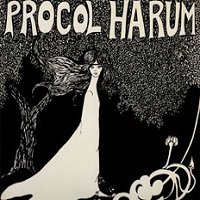 Procol Harum will always be remembered best for their classic debut-single "A Whiter Shade of Pale" that became one of the biggest hits that year, and have remained a true classic song ever since. It was also one of the first and (still) best examples of how to base a rock song in a theme from classical music, in this case Bach's Suite No. 3 in D minor. The song also featured most of the trademarks of the Procol-sound: the sweeping, classical-influenced organ of Matthew Fischer, the piano and strong vocals of Gary Brooker, and of course, the mysterious lyrics of Keith Reid. Another single in the form of "Homburg" followed up the song. This was a nice tune, although a little bit strained in its attempt at replicate "A Whiter Shade of Pale". The label put a lot of pressure on the band to make an album before they really were ready for it, and as a result of this, their self-titled debut-album became a rushed and poorly produced work that didn't even feature "A Whiter Shade of Pale". But the material on the album was still good enough to show the band's potential. The opening-track "Conquistador" must be considered to be classic Procol Harum, and it actually became their second greatest hit when they released it in an orchestrated version 5 years later. Fischer's style and sound on the organ can be heard best on tracks like "She Wandered Through the Garden Fence", "Kaleidoscope" and not at least on the instrumental "Repent Walpurgis". "Something Following Me" was Brooker in typical, soulful ballad-mood where Robin Trower also delivered some fine guitar-work. "A Christmas Camel" has a piano-riff that proves that a theme doesn't have to be complex to still sound mighty. There are also a few throwaways here, like "Mabel" and "Good Captain Clack", but most of the record consists of well-written and memorable songs. Procol Harum will always be remembered best for their classic debut-single "A Whiter Shade of Pale" that became one of the biggest hits that year, and have remained a true classic song ever since. It was also one of the first and (still) best examples of how to base a rock song in a theme from classical music, in this case Bach's Suite No. 3 in D minor. The song also featured most of the trademarks of the Procol-sound: the sweeping, classical-influenced organ of Matthew Fischer, the piano and strong vocals of Gary Brooker, and of course, the mysterious lyrics of Keith Reid. Another single in the form of "Homburg" followed up the song. This was a nice tune, although a little bit strained in its attempt at replicate "A Whiter Shade of Pale". The label put a lot of pressure on the band to make an album before they really were ready for it, and as a result of this, their self-titled debut-album became a rushed and poorly produced work that didn't even feature "A Whiter Shade of Pale". But the material on the album was still good enough to show the band's potential. The opening-track "Conquistador" must be considered to be classic Procol Harum, and it actually became their second greatest hit when they released it in an orchestrated version 5 years later. Fischer's style and sound on the organ can be heard best on tracks like "She Wandered Through the Garden Fence", "Kaleidoscope" and not at least on the instrumental "Repent Walpurgis". "Something Following Me" was Brooker in typical, soulful ballad-mood where Robin Trower also delivered some fine guitar-work. "A Christmas Camel" has a piano-riff that proves that a theme doesn't have to be complex to still sound mighty. There are also a few throwaways here, like "Mabel" and "Good Captain Clack", but most of the record consists of well-written and memorable songs.
Procol Harum - "Shine on Brightly" (Regal Zonophone 1968)
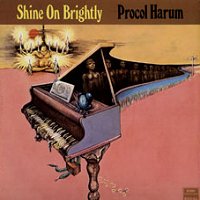 This is the Procol Harum album that more than any other came close to symphonic and progressive rock as it featured the 17-minute "In Held Twas In I" that was one of the first and most successful examples of how to tie several different songs together into a lengthy and complex suite. The song was easily their most ambitious and mysterious ever, and the lyrics were full of religious and spiritual imagery. Later progressive rock epics like Genesis' "Supper's Ready" and Van der Graaf Generator's "A Plague of Lighthouse Keepers" probably owes a lot to this track. But let's not forget about the rest of the album. Here are strong numbers like "Quite Rightly So", "Skip Softly My Moonbeams", "Rambling On" and the title-track. The lovely "Magdalena (My Regal Zonophone)" features some very old-styled organ and Mellotron from Fischer. By the way, the whole album is probably the most organ-dominated by all of Procol Harum's records. The only forgettable song is "Wish Me Well" that was a very uninteresting and basic blues-tune of the kind that they for some reason always insisted to include on their albums. This is the Procol Harum album that more than any other came close to symphonic and progressive rock as it featured the 17-minute "In Held Twas In I" that was one of the first and most successful examples of how to tie several different songs together into a lengthy and complex suite. The song was easily their most ambitious and mysterious ever, and the lyrics were full of religious and spiritual imagery. Later progressive rock epics like Genesis' "Supper's Ready" and Van der Graaf Generator's "A Plague of Lighthouse Keepers" probably owes a lot to this track. But let's not forget about the rest of the album. Here are strong numbers like "Quite Rightly So", "Skip Softly My Moonbeams", "Rambling On" and the title-track. The lovely "Magdalena (My Regal Zonophone)" features some very old-styled organ and Mellotron from Fischer. By the way, the whole album is probably the most organ-dominated by all of Procol Harum's records. The only forgettable song is "Wish Me Well" that was a very uninteresting and basic blues-tune of the kind that they for some reason always insisted to include on their albums.
Procol Harum - "A Salty Dog" (Regal Zonophone 1969)
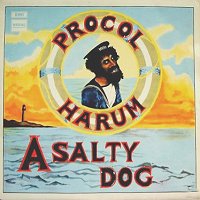 Procol Harum's third record was a loose concept-album where several of the songs told about old legends and stories from the sea. It's also many people's favourite by Procol Harum, and many of the band's finest tunes can be found here. The title-track is an orchestrated symphonic little masterpiece with a melody so beautiful and emotional as it can get. "Wreck of the Hesperus" is much in the same vein, both musically and lyrically. "Too Much Between Us" is an acoustic ballad where Fischer delivers some very atmospheric organ-playing, quite similar to that of Cressida's self-titled debut. And "All This and More" is simply one of their strongest melodies. The rest of the album is a bit more strolling and with a lighter mood, such as "The Milk of Human Kindness" and the ballsy folk-rock of "The Devil Came from Kansas". "Boredom" is also kind of folk-influenced, but in a more whimsical way. "Crucifixion Lane" is a soulful piece sung and written by Trower, while the progressive ballad "Pilgrims Progress" ends the record in a pleasant way. The plodding and intentionally poorly recorded blues of "Juicy John Pink" is the only weak spot on an otherwise classic album. Procol Harum's third record was a loose concept-album where several of the songs told about old legends and stories from the sea. It's also many people's favourite by Procol Harum, and many of the band's finest tunes can be found here. The title-track is an orchestrated symphonic little masterpiece with a melody so beautiful and emotional as it can get. "Wreck of the Hesperus" is much in the same vein, both musically and lyrically. "Too Much Between Us" is an acoustic ballad where Fischer delivers some very atmospheric organ-playing, quite similar to that of Cressida's self-titled debut. And "All This and More" is simply one of their strongest melodies. The rest of the album is a bit more strolling and with a lighter mood, such as "The Milk of Human Kindness" and the ballsy folk-rock of "The Devil Came from Kansas". "Boredom" is also kind of folk-influenced, but in a more whimsical way. "Crucifixion Lane" is a soulful piece sung and written by Trower, while the progressive ballad "Pilgrims Progress" ends the record in a pleasant way. The plodding and intentionally poorly recorded blues of "Juicy John Pink" is the only weak spot on an otherwise classic album.
Procol Harum - "Home" (Regal Zonophone 1970)
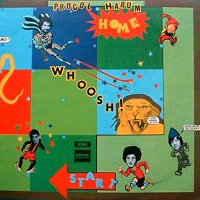 Matthew Fisher had left Procol Harum after "A Salty Dog" to pursue a career as a producer instead. He was replaced by Chris Copping, but the band still decided to keep the organ more in the background on "Home" and instead give more room for Trower's bluesy and hard rock-oriented guitar-playing. This wasn't necessary a change for the better, as I personally feel that some of Procol Harum's grandeur had got lost in the process. Despite the "funny"-looking cover, "Home" was the band's darkest album where almost every track dealt with death. The nightmarish lyrics of "The Dead Man's Dream" would have fitted into any death-metal album. This and the epic and complex "Whaling Stories" were the only tracks on the album that sounded close to classic Procol Harum, even if none of them are among their best ones. The rest of the record was made up of guitar-based, bluesy pop/rock that was decent enough to listen to, but nothing outstanding or particularly interesting. The three previous albums proved that Procol Harum was capable of producing far more distinguished music than what "Home" could offer. Not the best way to start their '70s career, although it could have been worse. Matthew Fisher had left Procol Harum after "A Salty Dog" to pursue a career as a producer instead. He was replaced by Chris Copping, but the band still decided to keep the organ more in the background on "Home" and instead give more room for Trower's bluesy and hard rock-oriented guitar-playing. This wasn't necessary a change for the better, as I personally feel that some of Procol Harum's grandeur had got lost in the process. Despite the "funny"-looking cover, "Home" was the band's darkest album where almost every track dealt with death. The nightmarish lyrics of "The Dead Man's Dream" would have fitted into any death-metal album. This and the epic and complex "Whaling Stories" were the only tracks on the album that sounded close to classic Procol Harum, even if none of them are among their best ones. The rest of the record was made up of guitar-based, bluesy pop/rock that was decent enough to listen to, but nothing outstanding or particularly interesting. The three previous albums proved that Procol Harum was capable of producing far more distinguished music than what "Home" could offer. Not the best way to start their '70s career, although it could have been worse.
Procol Harum - "Broken Barricades" (Chrysalis 1971)
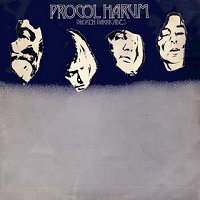 Trower turned his amps up even higher for "Broken Barricades" where the band almost had evolved into some kind of a sophisticated hard rock band. But the result was still a good album. The songwriting is much stronger and more outstanding than it was on "Home" and several classic Procol Harum-songs can be found here. The opener "Simple Sister" is easily one of their best tracks ever, and features one of the most thunderous riffs you'll ever hear, in addition to complex, quirky instrumental-parts that also includes a tasty string-arrangement. The contrast is quite big to the lush, symphonic beauty of the title-track and "Luskus Delph" that both probably had the strongest melodies on the album. "Playmate of the Mouth" featured a simplistic, yet creative brass-arrangement that gave the song much of its distinctive stamp. "Song for a Dreamer" is one of the weirdest songs the band ever recorded, and was a partly improvised psychedelic piece dedicated to Jimi Hendrix. "Power Failure" was yet another strong tune, along with the driving hard rock of "Memorial Drive" and "Poor Mohammed". But no matter how good the record was, the tensions and musical differences between the band and Robin Trower were clearer than ever, and it was no surprise that "Broken Barricades" turned out to be his last studio-album with Procol Harum. Trower turned his amps up even higher for "Broken Barricades" where the band almost had evolved into some kind of a sophisticated hard rock band. But the result was still a good album. The songwriting is much stronger and more outstanding than it was on "Home" and several classic Procol Harum-songs can be found here. The opener "Simple Sister" is easily one of their best tracks ever, and features one of the most thunderous riffs you'll ever hear, in addition to complex, quirky instrumental-parts that also includes a tasty string-arrangement. The contrast is quite big to the lush, symphonic beauty of the title-track and "Luskus Delph" that both probably had the strongest melodies on the album. "Playmate of the Mouth" featured a simplistic, yet creative brass-arrangement that gave the song much of its distinctive stamp. "Song for a Dreamer" is one of the weirdest songs the band ever recorded, and was a partly improvised psychedelic piece dedicated to Jimi Hendrix. "Power Failure" was yet another strong tune, along with the driving hard rock of "Memorial Drive" and "Poor Mohammed". But no matter how good the record was, the tensions and musical differences between the band and Robin Trower were clearer than ever, and it was no surprise that "Broken Barricades" turned out to be his last studio-album with Procol Harum.
Procol Harum - "Live In Concert with the Edmonton Symphony Orchestra" (Chrysalis 1972)
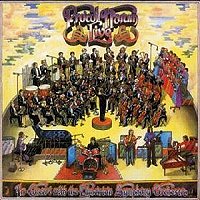 Procol Harum played a concert with the Edmonton Symphony Orchestra in late '71. The resulting album was their definitive progressive moment and my personal favourite by the band. The orchestra and band worked together as a whole, and the record stands as one of the best examples of how to fuse a rock band with an orchestra. The absence of "A Whiter Shade of Pale" from the track list may seems a bit strange, but it's on the other hand easy to understand that the band wanted to show that they didn't float on just that song. All the 5 songs here are classics, and here they get the grandiose and orchestrated treatment that they really deserved. Especially "Whaling Stories" benefits from it, and this version reveals that the arrangement on the studio-version simply was too thin and wimpy to carry the track and bring out its full potential. The version of "Conquistador" was released on single, and quickly became Procol Harum's second biggest hit. "A Salty Dog" is very similar to the original version, as that one had an orchestral arrangement too. "All This and More" is wisely enough not over-orchestrated as that would have ruined the melody, but is instead given a modest and tasteful arrangement that fits the track very well. "In Held Twas In I" sounds really impressive and majestic, and the finale makes me shiver when the choir sets in. Mighty. This is one of the very best albums you can get with Procol Harum, especially if you're out for their most progressive material. Procol Harum played a concert with the Edmonton Symphony Orchestra in late '71. The resulting album was their definitive progressive moment and my personal favourite by the band. The orchestra and band worked together as a whole, and the record stands as one of the best examples of how to fuse a rock band with an orchestra. The absence of "A Whiter Shade of Pale" from the track list may seems a bit strange, but it's on the other hand easy to understand that the band wanted to show that they didn't float on just that song. All the 5 songs here are classics, and here they get the grandiose and orchestrated treatment that they really deserved. Especially "Whaling Stories" benefits from it, and this version reveals that the arrangement on the studio-version simply was too thin and wimpy to carry the track and bring out its full potential. The version of "Conquistador" was released on single, and quickly became Procol Harum's second biggest hit. "A Salty Dog" is very similar to the original version, as that one had an orchestral arrangement too. "All This and More" is wisely enough not over-orchestrated as that would have ruined the melody, but is instead given a modest and tasteful arrangement that fits the track very well. "In Held Twas In I" sounds really impressive and majestic, and the finale makes me shiver when the choir sets in. Mighty. This is one of the very best albums you can get with Procol Harum, especially if you're out for their most progressive material.
Procol Harum - "Grand Hotel" (Chrysalis 1973)
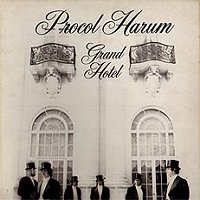 After the successful live-album the previous year, Procol Harum went to the studio in 1973 with their new guitarist Mick Grabham to record "Grand Hotel". The album turned out to be a very grandiose and symphonic effort with lots of orchestral arrangements. However, the arrangements were in many cases better than some of the material on the record. The awful "Souvenir of London" is Procol Harum at their most embarrassing, and "Robert's Box" is commercial drivel of worst sort. Many of the ballads, like "T.V. Caesar" and "For Liquorice John" are boring instead of sweeping and majestic. The title-track, the rocking "Bringing Home the Bacon" and the beautiful, baroque "Fires (Which Burns Brightly)" are the only really outstanding tracks on the album. The latter one also includes some very fitting female vocals. But this is mostly an album for devoted fans, and was the first true sign that the band were starting to lose it. After the successful live-album the previous year, Procol Harum went to the studio in 1973 with their new guitarist Mick Grabham to record "Grand Hotel". The album turned out to be a very grandiose and symphonic effort with lots of orchestral arrangements. However, the arrangements were in many cases better than some of the material on the record. The awful "Souvenir of London" is Procol Harum at their most embarrassing, and "Robert's Box" is commercial drivel of worst sort. Many of the ballads, like "T.V. Caesar" and "For Liquorice John" are boring instead of sweeping and majestic. The title-track, the rocking "Bringing Home the Bacon" and the beautiful, baroque "Fires (Which Burns Brightly)" are the only really outstanding tracks on the album. The latter one also includes some very fitting female vocals. But this is mostly an album for devoted fans, and was the first true sign that the band were starting to lose it.
Procol Harum - "Exotic Birds and Fruit" (Chrysalis 1974)
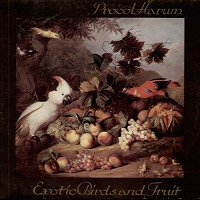 "Exotic Birds and Fruit" is usually regarded as the last good Procol Harum-album. And yes, it's a very powerful and well-produced '70s pop/rock record with tight and solid songs that beat most of the disappointing "Grand Hotel". The opener "Nothing But the Truth" and "Monsieur R. Monde" proved that the band still could rock and kick ass, even without Robin Trower. "As Strong as Samson" could very well be one of Procol Harum's most gorgeous and tasty songs ever. They also explored some more experimental avenues with the sinister and atmospheric "The Thin End of the Wedge". "Beyond the Pale" flirted with Russian folk-music, while "Fresh Fruit" is whimsical music hall stuff. "Butterfly Boys" is a fresh and upbeat song with the same catchy quality as the rest of the album. "The Idol" is a slow and dark piece that becomes a bit repetitive, but the song itself is still good. The rest of Procol Harum's career is of interest to die-hard fans only. After releasing two forgettable albums ("Procol's Ninth" and "Something Magic") the band wisely decided to quit in the late '70s. "Exotic Birds and Fruit" is usually regarded as the last good Procol Harum-album. And yes, it's a very powerful and well-produced '70s pop/rock record with tight and solid songs that beat most of the disappointing "Grand Hotel". The opener "Nothing But the Truth" and "Monsieur R. Monde" proved that the band still could rock and kick ass, even without Robin Trower. "As Strong as Samson" could very well be one of Procol Harum's most gorgeous and tasty songs ever. They also explored some more experimental avenues with the sinister and atmospheric "The Thin End of the Wedge". "Beyond the Pale" flirted with Russian folk-music, while "Fresh Fruit" is whimsical music hall stuff. "Butterfly Boys" is a fresh and upbeat song with the same catchy quality as the rest of the album. "The Idol" is a slow and dark piece that becomes a bit repetitive, but the song itself is still good. The rest of Procol Harum's career is of interest to die-hard fans only. After releasing two forgettable albums ("Procol's Ninth" and "Something Magic") the band wisely decided to quit in the late '70s.

|